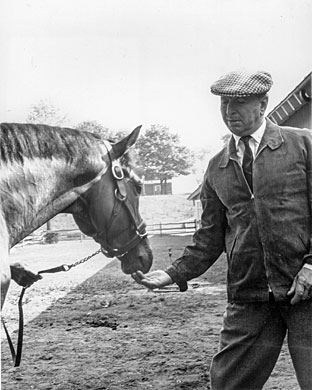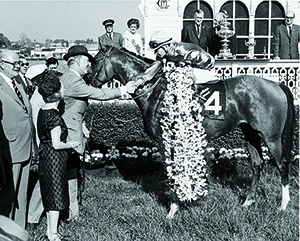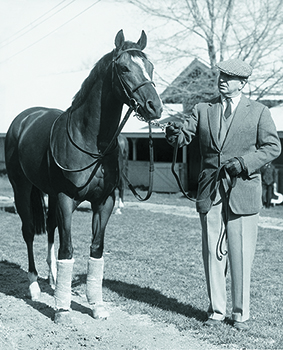The charm of horse racing lies primarily in the animals that do
it—their beauty, grace, power and their degree of class. But there is an
undeniable attraction to the colorful human beings that make it happen.
The purpose of this blog is to share my stories about some of these
characters. My requisites in the selection: I had dealings with them,
their antics and accomplishments should not be forgotten, and that at least most of them are
no longer with us. — Cot Campbell
Horatio
Luro-El Gran Senor. Has there ever existed in the world of Thoroughbred racing
a human being who combined as much exquisite horsemanship with as much glamour?
I do not think so.
He was a tall, handsome
boulevardier from a distinguished Argentine family, a charming polo-playing and
lady's man, who came to the states before World War II, teamed up with Charlie
Whittingham in California and they hustled their way into the top of the Big
Time in the racing world. Again, with a combination of superb horsemanship,
chutzpah and personality.

Horatio Luro, Courtesy of NYRA
To meet Horatio was to never
forget him. He looked like "somebody." He stood six foot-three, had a
pencil-thin mustache, quite handsome, with a dashing, elegant, but devilish,
look about him. He dressed in the finest tradition of Saville Row. Even in the
early days, when he was flat broke, he was somehow able to wine and dine and
operate with the cream of high society. He knew how to buy a good horse, and he
surely knew how to train one. He had a fling with the gorgeous actress, Lana
Turner (quite an accomplishment), and later was married for 37 years to a truly
impressive lady.
No horse trainer ever had a
deeper impact on the Thoroughbred breed. He brought to this country the
splendid Princequillo and developed him into one of the greatest stayers of his
time. At stud, with Bull Hancock at Claiborne, Princequillo became the dominant
influence of stamina in the sport. Later Luro took a blocky, little bay horse
that did not meet his reserve when E.P. Taylor sold him as a yearling and made
him into a magnificent race horse and arguably the greatest sire that ever
lived. His name was Northern Dancer. The Senor won the Derby with him; he also
won it with Decidedly. Space would literally not permit a list of other
distinguished stakes winners trained by Luro.
Like most great characters with
panache and charm, he was not always easy. He was a prima donna, had a temper,
and since he never quite mastered all the nuances of the English language, he
could stumble verbally into awkward situations. That's when his wife Frances,
who was sophisticated and urbane, and oozed charm from every pore, could help
out immeasurably when some diplomacy was needed. However, his own legendary
brand was usually quite adequate. An example of that was tested when he ran a
filly at Atlantic City. She was winning quite easily, but inexplicably, when
approaching the wire, she careened over the rail, ran into the lake and
panicked. Sadly, she drowned before anyone could reach her. Later, Horatio
lamented, "How am I going to call the owner and tell him that the filly was
winning the race but then drowned?"
Much earlier, he had encountered
another awkward situation back home in Argentina. Never in my rather long life
have I encountered-or seen-a human being that had actually engaged in a duel.
Horatio Luro did! In a dispute over a polo pony board bill, Horatio struck the
landlord, an Argentine nobleman. The infuriated injured party "demanded
satisfaction." Seconds were chosen, weapons selected. Luro was given the
choice, and because his adversary had just returned from a hunting trip, swords
rather than guns seemed the smarter option. Horatio took a quick course in
fencing, which paid off significantly. He was advised that because of his six
foot-three height, he should simply keep his weapon extended into the face of
the other shorter man. This he did, and his raging opponent ran into the sword,
nicked his arm, blood was drawn, and the duel had been satisfied. Perhaps
Thoroughbred racing would have been the poorer had revolvers been the choice.
A well-documented example of his
temper came at the expense of a jockey named Eddie Belmonte. Subbing for Luro's
regular rider in a race at Saratoga, he was told to take the horse back and
make one big run. Instead Eddie broke and gunned the horse to the lead and
hustled him to stay there. He ran out of gas. Luro had placed a rather sizeable
bet on the horse, and when the rider dismounted the Senor tried with
considerable enthusiasm to choke him-in front of the grandstand. He was
suspended for 30 days for this rather unpleasant behavior.
He was not reluctant to take
suggestions from assistants and exercise riders. And he really hit it off with
jockeys remarkably well. He liked Bill Hartack, respected his opinion, and
adopted a number of his suggestions. Hartack, a wonderful rider, had the
disposition of a viper, but there was mutual respect and harmony between him
and the Senor. The well-used expression of today, having to do with asking too
much of a horse, was born prior to the running of the 1960 Blue Grass Stakes.
Horatio told Bill, "This is not our main objective. Do not squeeze the lemon
dry." Hartack was a man who could squeeze the hell out of the lemon, but he did
not on Victoria Park that day. Still he deserted him in the Derby a couple of
weeks later, and energetically rode Venetian Way to victory.

Luro shaking hands with Hartack in the Preakness
Stakes winner's circle
Horatio's aforementioned wife,
Frances, owned a large farm near Atlanta in Cartersville, Ga. Luro converted
this into a training center, and Dogwood was one of its clients in the late
sixties and early seventies before we built our own farm. Frances was very
prominent in Atlanta (and most other) social circles. She had a daughter, Cary,
who was named "debutante of the year," and subsequently was married a fair
amount of times. Still another nuptial was being planned at the farm for
Horatio's much-married step-daughter, and it was to be a big social event,
involving a rehearsal, and a gala rehearsal dinner. Horatio was, of course, summoned
back from Belmont Park for the event, and he groused, "I do not see the need
for rehearsal. She has done this many times, and must be familiar with the
procedure by now."
Frances and Horatio were at the
very top of the social ladder in the glamour days of racing. Being new to the
game in the early seventies, my wife Anne and I were flattered when they took
note of us in some insignificant way. This led to an embarrassing situation one
year in Florida. Frances was the chairwoman of the elegant Flamingo Ball, which
took place at Hialeah. She, of course, was hustling participation, and zeroed
in on Anne and me. Now Frances was wonderful and gracious, but she did have a
little con in her. And she did mean to fill up the tables at the Ball. She
cooed to Anne and me, "Horatio and I are so hoping you all will join us at the
Ball!" We thought this meant, "Come sit with us at our table." What a nice
social breakthrough for a young couple! What she really meant was, "Buy two
tickets to the Ball, and use them."
We arrived at the Ball, and
breezily informed the person at the door that we were guests of the Luros'.
Oddly we were not on the list. Obviously an omission. So, we paid for two, went
in, and excitedly sought out the Luro table. It was chock full of heavy-hitters,
of course. Frances waved cordially, but vaguely. We got the picture, and found
a couple of spots at a table-near the kitchen.
Horatio and Frances were a great
team. Just as Penny Chenery contributed to the overall image of Secretariat, so
did Frances Luro contribute enormously to the dashing, debonair persona of the
Senor. He trained well into his eighties, then turned over the stock to his
beloved step-grandson, Billy Wright, who still operates Old Mill Farm in
Cartersville, Ga.
We will not see the likes of
Horatio Luro again.

Luro with Northern Dancer before the Blue
Grass Stakes




